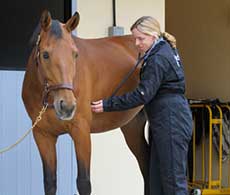
Can your horse’s gut protect his health?
Clare Barfoot, a Spillers registered nutritionist, reveals the extraordinary ecosystem within your horse’s gut and how it can help to keep him fighting fit from the inside out.
Hidden deep within your horse’s abdomen and intestines is an army of hard-working bacteria. In the world of human medicine, these microscopic marvels of the gut are fast emerging as critical to many aspects of wellbeing. Experts believe that they aid digestion, boost our immune system and even affect our mood. Now veterinary researchers are beginning to discover the true potential of bacteria in the equine gut. Recent studies have revealed some key findings. We know that a diverse but balanced gut environment (a ‘happy tummy’) will help maintain and protect a horse’s health, and that any upset in the equilibrium can undermine his defences and leave him prone to illness. But how can we nurture this extraordinary ecosystem to keep our horses fit and healthy?
Where are we in our understanding of equine gut health?
‘We are now at the point of trying to identify which microbes are present in a horse’s gut, how abundant they are and how they interact with their environment,’ says Clare. ‘This will help us to understand their role in health and disease. For example, in the future we may be able to predict the likelihood of an individual horse becoming obese and his ability to lose weight.
‘Research began in the early 2000s and is still in its infancy,’ says Clare, who likens the scale of the investigations to a mission to map Mars. ‘We have only really scratched the surface. Where we once relied upon crude culturing techniques to identify intestinal microbes, we can now use much more sophisticated methods, which includes examining genetic material.’
Why is a horse’s gut so important to his health?
‘The equine gut is colonised by quadrillions of micro-organisms and their genetic material, known collectively as the “microbiome”,’ explains Clare. ‘These bacteria, or “microbes”, play vital roles in maintaining health, including forming a robust immune system.
‘Another important function relates to digestion,’ adds Clare. ‘A horse relies heavily on the microbes that are mainly present in his hindgut (the rear of the digestive system) to ferment fibre, as the enzymes in his gut aren’t able to break it down. The fermented fibre creates short-chain fatty acids, which are then absorbed across the gut, into the bloodstream, and used for energy. This is why horses are known as hindgut fermenters, and depend on a healthy microbiome.’
How do ‘good’ and ‘bad’ bacteria differ?
‘Some bacteria are considered “good” because they contribute to health in a positive way, such as the fibre fermenters that provide energy to their host,’ says Clare. “On the other hand, “bad” bacteria can cause disease – such as colic, laminitis and colitis (a severe inflammation of the gut wall) – especially if they cross through the gut wall into the blood stream, or significantly increase in number and compete with the good bacteria.
What are the key research findings into gut health?
‘Studies suggest that every horse’s microbiome is unique,’ says Clare, explaining that a standard bacterial “blueprint” may not exist. ‘It also appears that the number of common microbial species that make up the core of the gut population is smaller and less stable in horses than it is in humans. This may be one of the reasons why horses can be more sensitive to dietary change, especially veterans who have been found to show even less bacterial diversity.’
Can we tell if something is amiss with a horse’s microbiome?
‘A horse’s droppings will offer clues,’ says Clare. ‘Diarrhoea and scouring, even if not caused directly by a bacterial imbalance, will affect the gut environment.
‘Many conditions can either be caused by, or create, a challenged microbiome. In addition to colic, colitis and laminitis, this is linked to inflammatory bowel disease and even equine grass sickness. But unless your horse needs testing for a specific pathogen, such as salmonella for example, a faecal sample is not particularly useful as an indicator of gut health,’ she adds. ‘In the future, however, when we know more about the equine microbiome, this could give us vital information.’
Can feeding a horse probiotics increase healthy gut bacteria?
‘Probiotics are thought to help maintain or restore the health of the intestinal microbiome,’ Clare explains. ‘However, there are no live bacterial products currently registered for horses in the UK. What’s more, there isn’t much clinical evidence supporting their use. We simply don’t know whether giving a horse bacterial probiotics introduces the correct organisms at the appropriate dose, or if it is even possible to influence micro-organisms in this way.’
What other steps can we take?
‘There are some simple ways to maintain a happy microbiome and a healthy horse,’ adds Clare. ‘Avoid any abrupt dietary adjustments, change hard feed by no more than half a kilo every other day and allow two to three weeks to switch to a new forage source. Stick to a high-fibre forage-based diet where possible, as a starch overload can upset the delicate balance of the hindgut microbes. Be aware, too, that antibiotic treatment, travelling and stress in general can all negatively affect the state of your horse’s gut microbiome.’


